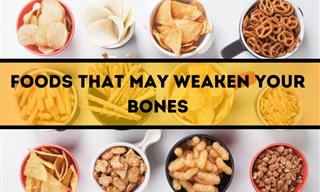Strong and healthy bones are essential for maintaining overall well-being and mobility throughout life. As we become older, bone health becomes more important, and our food plays an important part in preserving strong bones. While some foods are beneficial to bone health, several others might be harmful. This article will highlight eight foods to avoid if you want to maintain your bones strong and robust.
Related: Did You Know That These Foods Can Help Heal Your Bones?
1. High sodium foods

Salt weakens bones over time by removing calcium from the bone matrix. Dietitians estimate that for every 2,300 milligrams of sodium intake, about 40 milligrams of calcium are depleted. Foods that contain salt include canned soup, canned and bottled sauces, deli meats, frozen meals, canned vegetables, store-bought baked goods, pizza, and fast food, such as hamburgers and fries.
A study published in the Asia Pacific Journal of Clinical Nutrition in December 2016 discovered that males who ate salty meals were more prone to osteoporosis, a disease that weakens the bones. Another study published in the journal Osteoporosis International in January 2017 discovered this link for postmenopausal women as well.
2. Alcohol

Alcohol consumption can have adverse effects on bone health. The National Institute of Arthritis and Musculoskeletal and Skin Diseases (NIAMSD) states that alcohol can hinder the absorption of calcium and vitamin D in the body. Furthermore, chronic heavy drinking can lead to hormone imbalances, which in turn can interfere with the processes of bone formation and degradation. Hence, those with osteoporosis might find it beneficial to restrict their alcohol consumption.
3. Sugary snacks

Studies have shown that excessive sugar consumption can have adverse effects on bone health. Consuming too much sugar can lead to the excretion of calcium, magnesium, and potassium through urine. Moreover, sugar can hinder calcium absorption by reducing vitamin D levels and impairing the process of bone formation. Added sugars should not account for more than 10% of an individual's daily calorie intake, per the Dietary Guidelines for Americans.
Satisfy your sweet craving with prunes, cranberries, and other fruits high in antioxidants, which are beneficial nutrients that promote bone health.
4. Caffeine

Doctors warn that consuming too much caffeine results in the depletion of calcium from bones, weakening them. Approximately 6 milligrams of calcium are lost for every 100 milligrams of caffeine consumed.
Research published in BMC Musculoskeletal Disorders found that caffeine intake was associated with decreased bone density in postmenopausal women. Furthermore, a study featured in the European Journal of Clinical Nutrition in January 2016 revealed that when caffeine is consumed alongside sugary foods, it can have a more pronounced impact on the bone health of postmenopausal women.
To avoid osteoporosis, drink decaf coffees and teas and limit your intake of sweet foods, especially those containing caffeine, such as chocolate.
5. Carbonated drinks

An excessive intake of carbonated beverages, like sodas and soft drinks, can have detrimental effects on bone health. This is primarily attributed to their elevated phosphoric acid content, which induces heightened acidity in the bloodstream. This causes the body to take calcium from the bones in order to lower blood acidity levels. As a result, bone mineral density diminishes, and the risk of fracture increases.
6. Protein-rich foods

Protein is a nutrient that the body needs, which takes around 1 gram per kilogram of body weight. People who follow the current trend of high-protein diets often consume more protein than is necessary. This excess protein consumption might cause a calcium imbalance, resulting in diminished bone strength. Those who consume an excessive amount of protein, particularly from animal sources, are at a higher risk of losing bone density. Therefore, it is best to maintain a balanced protein diet that fulfills your body's actual needs.
Related: Follow These Tips for Healthy, Strong Bones!
7. Vitamin A-rich foods

Research has shown us the benefits of adequate vitamin A intake from sources like eggs, full-fat dairy, liver, and fortified foods, supporting both vision and immune function. However, there are some potential downsides of excessive vitamin A consumption too, particularly for the bones. One study discovered that those with daily intakes exceeding 5,000 international units (IUs) faced more than double the fracture risk compared to those consuming less than 1,600 IUs per day.
Additionally, keep in mind that the majority of multivitamins include vitamin A, potentially leading to an intake well above the recommended 5,000 IUs per day—an amount that several experts believe is excessive.
8. Spinach

While green leafy vegetables are a great source of calcium, their oxalate content can obstruct calcium absorption, rendering them unavailable to the body. Although this effect is not consistent among all leafy greens, certain ones like spinach and kale do interfere with calcium absorption. To maximize the nutritional benefits of leafy greens, consider consuming them alongside calcium-rich foods that the body can easily absorb, like cheese.
 Go to BabaMail
Go to BabaMail





























































